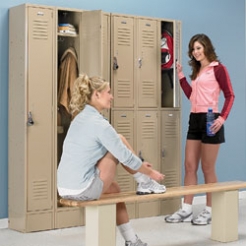 Employee lockers provide a legal grey area for employers: Are they the property of the employer or the employee? Do employers have a right to search employee lockers or is it an invasion of worker’s privacy?
Employee lockers provide a legal grey area for employers: Are they the property of the employer or the employee? Do employers have a right to search employee lockers or is it an invasion of worker’s privacy?
If there is no clear-cut policy that has been drawn up by management and provided to employees, the simple act of cutting a padlock and searching an employee’s locker without consent can lead to serious legal consequences. Employees have successfully sued employers for unreasonable search and seizures, invasion of privacy, and infliction of emotional distress.
In one precedent-setting case that was decided in Houston, Texas, in 1984, an employee of Kmart sued the company after her manager searched cut her padlock and searched her locker without her consent. The court ruled that the worker had a reasonable expectation of privacy that the manager violated and Kmart was ordered to pay the worker $100,000 in punititive damages.
Even if an employer successfully defends itself against this type of litigation, it can still be costly in terms of legal fees, court costs and lost productivity.
Have a Locker Search Policy
A simple way around this conundrum is to draw up a simple policy informing employees that the employer reserves the right to conduct lock searches to monitor compliance with safety rules, to prevent theft, and to enforce work rules banning the use and possession of alcohol, drugs, guns and other contraband items on company property.
Employees should be presented with two printed of the policy. One is theirs to keep. The second should be read, signed, dated and returned to their manager, who can then place the acknowledged policy in the employee’s file. That way, if there is ever an instance in which reasonable cause exists to search the employee’s locker, management can produce documentation that the worker was aware of and acknowledged the company’s locker search policy.
How to Prevent Cutting Padlocks
Some companies prohibit workers from storing anything in company lockers overnight or while they are not working. Workers are required to empty their lockers completely at the end of their shift so that they can be used by incoming workers. This sidesteps many of the personal privacy issues and also reduces the number of lockers an employer needs to provide to its workers.
Another option is to provide employees with access to combination lockers or require workers to use only combination padlocks on company lockers, with the employee supplying the combination to managers in advance.
Prudence and precaution should be taken whenever the issue of employee privacy or potential employee misconduct could become an issue. Employers should always have either company security personnel or local law enforcement on hand whenever an employee locker must be searched. This provides both a second set of eyes as well as additional security in case there is a conflict with the worker.
If you are considering supplying lockers for your workers, it’s important that you first think through these privacy issues. When you are ready to install the lockers, Bahrns offers a comprehensive selection of combination lockers, padlock lockers and locker accessories.
